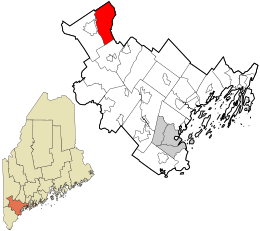Harrison, Maine
| Harrison, Maine | |
|---|---|
| Town | |

Long Lake, c. 1910
|
|
 Location in Cumberland County and the state of Maine. |
|
| Coordinates: 44°6′14″N 70°39′12″W / 44.10389°N 70.65333°W | |
| Country | United States |
| State | Maine |
| County | Cumberland |
| Incorporated | 1805 |
| Area | |
| • Total | 36.81 sq mi (95.34 km2) |
| • Land | 33.19 sq mi (85.96 km2) |
| • Water | 3.62 sq mi (9.38 km2) |
| Elevation | 577 ft (176 m) |
| Population (2010) | |
| • Total | 2,730 |
| • Estimate (2012) | 2,762 |
| • Density | 82.3/sq mi (31.8/km2) |
| Time zone | Eastern (EST) (UTC-5) |
| • Summer (DST) | EDT (UTC-4) |
| ZIP code | 04040 |
| Area code(s) | 207 |
| FIPS code | 23-31600 |
| GNIS feature ID | 0582513 |
| Website | www |
| Crystal Lake | |
|---|---|
| Coordinates | 44°07′N 70°40′W / 44.117°N 70.667°W |
| Primary outflows | Long Lake |
| Basin countries | United States |
| Max. length | 1.5 mi (2.4 km) |
| Surface area | 446 acres (180 ha) |
| Max. depth | 65 feet (20 m) |
| Water volume | 14,254 acre·ft (17,582,000 m3) |
| Surface elevation | 308 ft (94 m) |
Harrison is a town in Cumberland County, Maine, United States. The population was 2,730 at the 2010 census. A historic resort area, Harrison straddles Long Lake and Crystal Lake. It is part of the Portland–South Portland–Biddeford, Maine metropolitan statistical area.
The Massachusetts General Court granted Otis Field Plantation in 1771 to James Otis and other heirs of Captain John Gorham and his company for their service in the 1690 Battle of Quebec. It replaced a 1736 grant which had been ruled invalid. In 1797, the plantation was incorporated as Otisfield. On March 8, 1805, Harrison was set off and incorporated from portions of Otisfield and Bridgton. It was named after a principal landowner, Harrison Gray Otis of Boston, the heir of James Otis.
In the autumn of 1792, two brothers from Gorham, John and Nathan Carsley, built a camp and cleared land in Harrison. During the winter they returned to Gorham, coming back in March 1793 with their wives. Because John Carsley and his wife remained in Harrison when Nathan Carsley and his wife resumed living in Gorham until 1796, he is considered the town's first permanent settler. More pioneers arrived, living in log houses chinked with moss. The outlet of Crystal Lake into Long Lake provided water power for industry, and James Sampson erected at Harrison village the first sawmill and gristmill. Over the years other industries followed, including a wire-making business, blacksmithy, shingle mill, harness-maker, foundry, carriage maker, clothing maker and shoe shop. Scribner's Mill (now a museum) was built in 1847 on the Crooked River. On the Bear River, in 1867 the Harrison Water Power Company established the Bear River Woolen Mill, destroyed by fire in 1872.
...
Wikipedia
